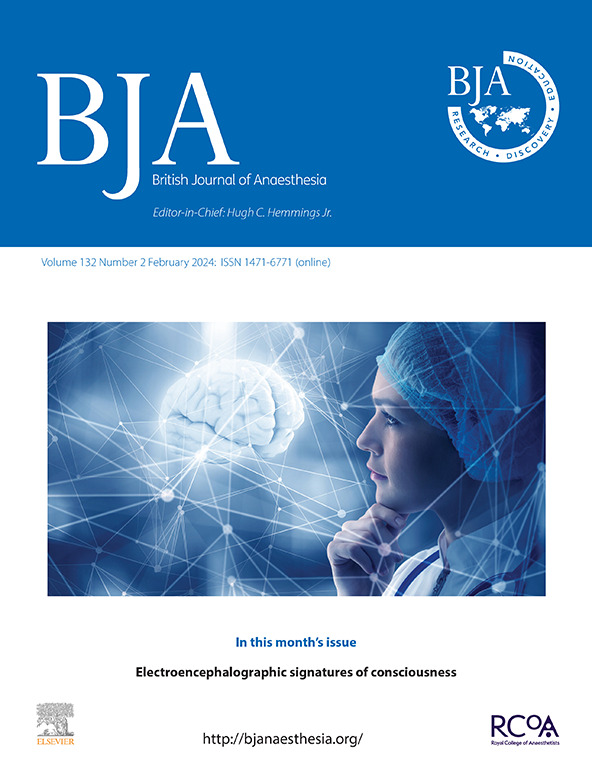Perioperative fluid management: evidence-based consensus recommendations from the international multidisciplinary PeriOperative Quality Initiative
IF 9.1
1区 医学
Q1 ANESTHESIOLOGY
引用次数: 0
Abstract
Fluid therapy is an integral component of perioperative management. In light of emerging evidence in this area, the Perioperative Quality Initiative (POQI) convened an international multiprofessional expert meeting to generate evidence-based consensus recommendations for fluid management in patients undergoing surgery. This article provides a summary of the recommendations for perioperative fluid management of surgical patients from the preoperative period until hospital discharge and for all types of elective and emergency surgery, apart from burn injuries and head and neck surgery. Where evidence was lacking, recommendations for future research were generated. Specific recommendations are made for fluid management in elective major noncardiac surgery, cardiopulmonary bypass, thoracic surgery, neurosurgery, minor noncardiac surgery under general anaesthesia, and critical illness. There are ongoing gaps in knowledge resulting in variation in practice and some disagreement with our consensus recommendations. Perioperative fluid management should be individualised, taking into account the type of surgery and important patient factors, including intravascular volume status and acute and chronic comorbidities. Recommendations are made for further research in perioperative fluid management to address important gaps.
围手术期液体管理:国际多学科围手术期质量倡议提出的循证共识建议。
液体疗法是围手术期管理不可或缺的组成部分。鉴于该领域新出现的证据,围手术期质量倡议(POQI)召开了一次国际多专业专家会议,就手术患者的液体管理提出了基于证据的共识建议。本文概述了手术患者从术前到出院的围手术期液体管理建议,适用于除烧伤和头颈部手术以外的所有类型的择期手术和急诊手术。在缺乏证据的情况下,提出了未来研究的建议。对择期非心脏大手术、心肺旁路手术、胸外科手术、神经外科手术、全身麻醉下的非心脏小手术以及危重病人的液体管理提出了具体建议。目前的知识空白导致了实践中的差异,并与我们的共识建议存在一些分歧。围术期液体管理应因人而异,考虑手术类型和患者的重要因素,包括血管内容量状态和急慢性合并症。我们建议进一步研究围术期液体管理,以填补重要空白。
本文章由计算机程序翻译,如有差异,请以英文原文为准。
求助全文
约1分钟内获得全文
求助全文
来源期刊
CiteScore
13.50
自引率
7.10%
发文量
488
审稿时长
27 days
期刊介绍:
The British Journal of Anaesthesia (BJA) is a prestigious publication that covers a wide range of topics in anaesthesia, critical care medicine, pain medicine, and perioperative medicine. It aims to disseminate high-impact original research, spanning fundamental, translational, and clinical sciences, as well as clinical practice, technology, education, and training. Additionally, the journal features review articles, notable case reports, correspondence, and special articles that appeal to a broader audience.
The BJA is proudly associated with The Royal College of Anaesthetists, The College of Anaesthesiologists of Ireland, and The Hong Kong College of Anaesthesiologists. This partnership provides members of these esteemed institutions with access to not only the BJA but also its sister publication, BJA Education. It is essential to note that both journals maintain their editorial independence.
Overall, the BJA offers a diverse and comprehensive platform for anaesthetists, critical care physicians, pain specialists, and perioperative medicine practitioners to contribute and stay updated with the latest advancements in their respective fields.

 求助内容:
求助内容: 应助结果提醒方式:
应助结果提醒方式:


